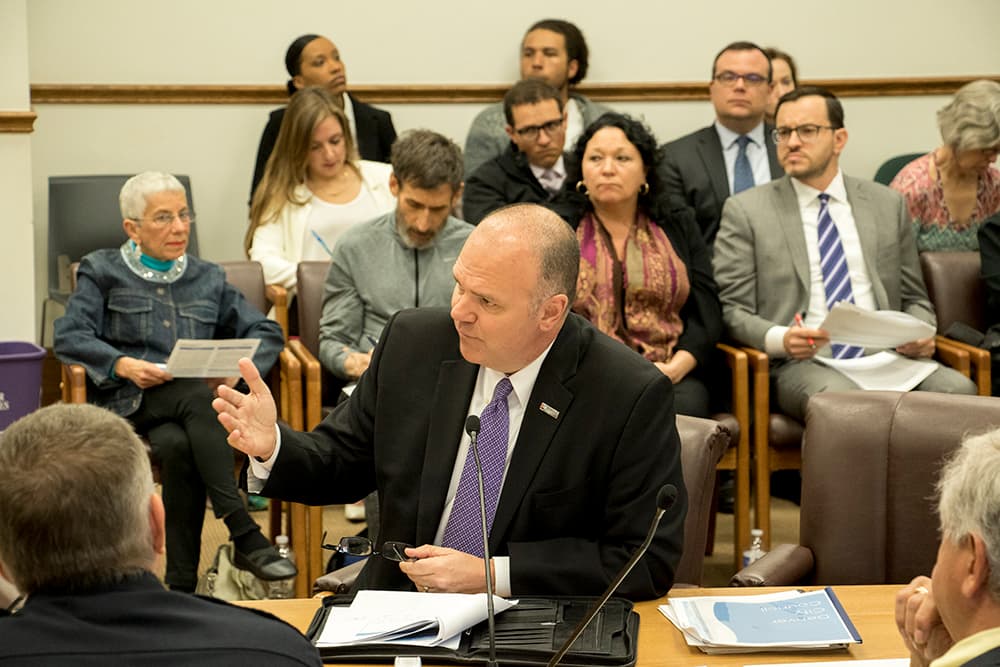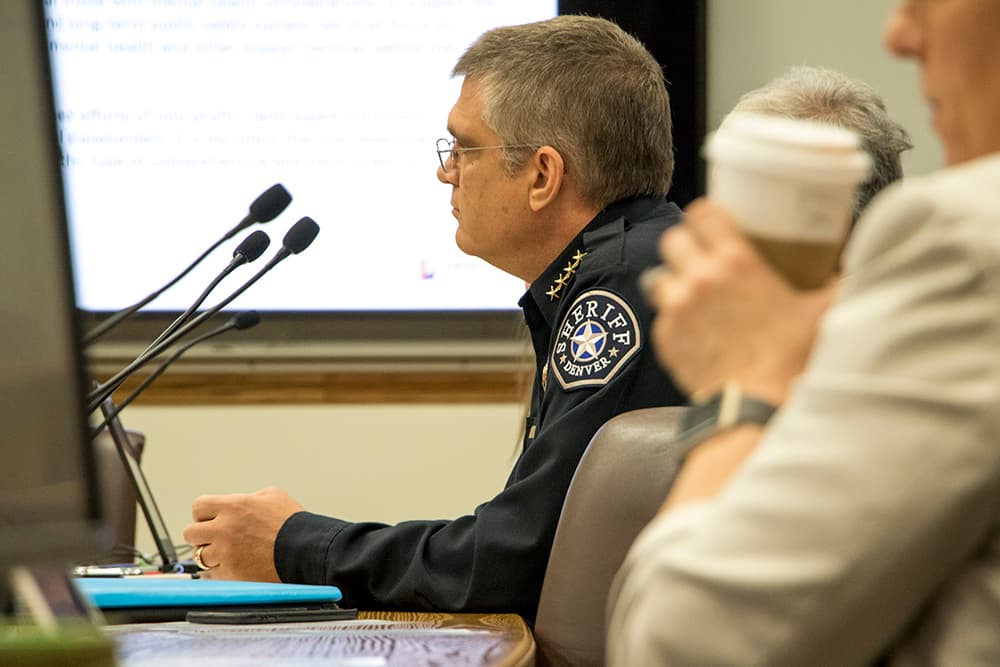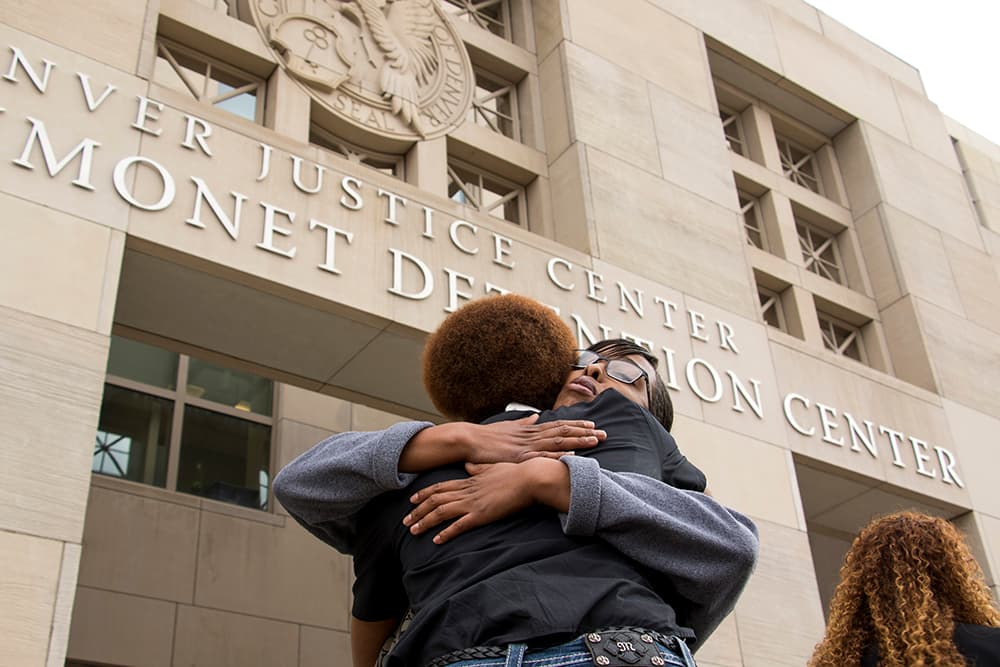
The new leader of Denver's safety services made one of his first major public appearances on Wednesday, responding to intense criticism of the Denver Sheriff's Department in the wake of a man's death in jail.
At a meeting with Denver City Council members, safety director Troy Riggs raised the possibility that he could put civilians in charge of more oversight roles within the sheriff's department, including internal affairs. Internal affairs handles investigations of deputies' behavior in cases like the death of Michael Marshall.
"Civilianizing the internal affairs bureau is certainly a sound recommendation and something we need to look at," Riggs said, adding that the change could ease the jail's staffing shortage.
Nick Mitchell, independent monitor for Denver, had sharply criticized the sheriff's attempts to investigate the death of Marshall, who choked after being restrained in a Denver jail. Mitchell's report showed that internal investigators had tried to close their investigation into the death without interviewing the deputies or nurses who were involved.
Still, Riggs has stopped short of promising changes at internal affairs.
The department is preparing "to support" more civilian jobs in internal affairs, while the possibility of "adding civilians at the management level is also being considered," according to a presentation from the safety department. Mitchell has suggested that civilians could run the bureau, saying that internal affairs "excelled" under previous civilian management.
The safety department also said it would try to prevent the hiring of deputies and officers who are currently under investigation. That's in response to the fact that a deputy involved in the Marshall incident was able to get a job at the city's police department even while the investigation was ongoing.
It's still not clear how that happened.

Why wasn't anyone punished?
The meeting on Wednesday showed some continuing divisions in the aftermath of the Marshall case, especially over the fact that no one has been personally disciplined, while the city itself paid out a large settlement to Marshall's family. (See our earlier explainer.)
"It boggles the mind that we have a system that takes a mentally ill individual, holds him on a $100 bond in a situation that results in his death," said Councilman Paul Kashmann.
"And yet that same system … we pay almost $5 million because we agree that the city fails to protect the life of the inmate -- but there’s no way we go within the city structure and assess any discipline."
The safety department did attempt to discipline three of the employees involved. The original suspensions, ranging from 10 to 16 days, were lighter than what some deputies received for offenses that didn't involve deaths. They were overturned on appeal, and are still being contested.
Jess Vigil, deputy director of safety, said that the attempted punishment reflected the facts, and that the deputies' actions reflected their training.
"Deputies then were trained to quell or put down any resistance. There’s evidence in the case that Mr. Marshall resisted during significant parts of the interaction," he said. (Marshall at times displayed extraordinary strength, according to deputies, but also went fully unconscious at one point.)
"We determined that they acted inappropriately because there were options that didn’t include the level of force that was used," Vigil said. But, he added, "they didn’t act with malice or evil intent or purpose to intentionally harm Mr. Marshall."
Regardless, all three employees' had their suspensions overturned by a city hearing officer.
Months later, the city made changes to the disciplinary process that could make it easier for punishments to stick.
While the city previously had to prove at each hearing that the misconduct occurred, now "the burden of proof is upon the deputy to show that the discipline imposed was clearly erroneous," Vigil said.
"I really think, moving forward, misconduct that occurs will be dealt with in a manner that is appropriate, that continues to be based on the evidence, but that gives us more latitude, more authority to address misconduct appropriately," he said.
Still, the safety department stopped short of adopting the monitor's recommendations on discipline, including a suggestion that the city should explain why it chose various levels of punishment. In other cases, discipline has ben cancelled because of a lack of detail in the disciplinary orders, as Mitchell noted in his report.

Safety officials said that the city's jails are filled with people who are mentally ill.
"The Denver Sheriff’s Department is one of the largest mental health providers in the state," Riggs said, acknowledging that the safety department needed to do more to address the needs of those people.
"It’s a revolving door at this point," Vigil said, referring to the way people come in and out of jail.
In response, Riggs has a team compiling new statistics on mental health in the jail system. The sheriff's department also has introduced new training on excited delirium, the mental state that may have caused Marshall to continue resisting deputies.
The safety leaders also said that it's increasingly difficult to find and retain staff for the city's jails. Riggs suggested that the department could offer new rewards for sheriff's employees, such as the opportunity to work for the police.
Meanwhile, larger changes are underway. The Denver Sheriff's Department is expected to deliver a report this summer on its progress on 400-plus earlier recommendations.
One longtime observer, though, has kept his skepticism. "We remove the heads," said Pastor Terrence Hughes. "The bodies that usually work the process stay the same."










